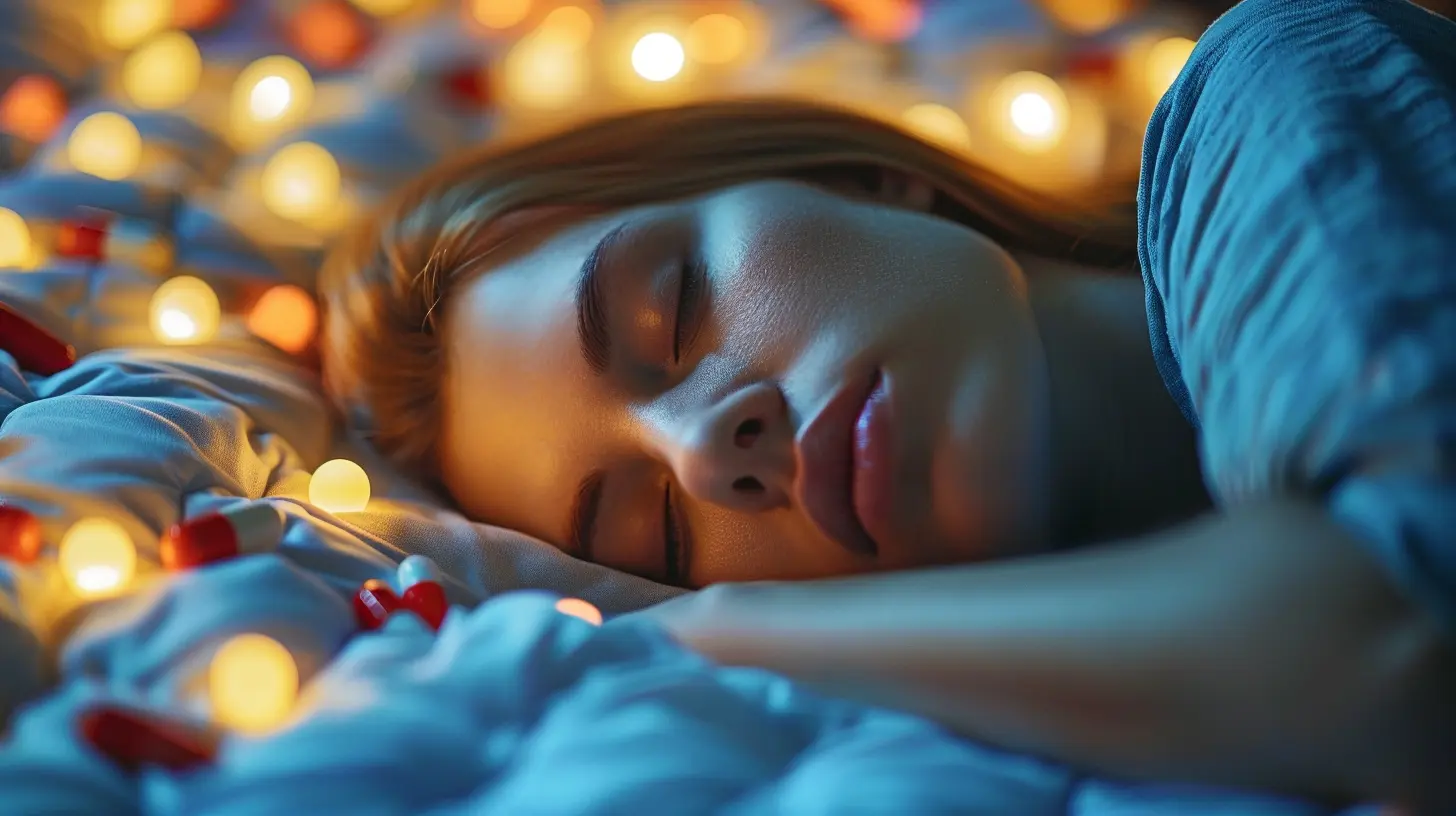Sleeping Pills: What You Need to Know About Their Long-Term Use
7 June 2025
Let’s be real, tossing and turning all night while watching the clock isn't fun. That’s where sleeping pills come in — a seemingly quick, no-nonsense fix for sleepless nights. But before you start popping one every night like a multivitamin, there’s a lot you should know. Especially about what happens when you rely on them for the long haul.
In this article, we’re going to dive into the nitty-gritty of long-term sleeping pill use. We're not here to scare you, but to give you the straight facts. Ready? Let’s peel back the blanket on sleep meds.
What Are Sleeping Pills, Really?
Let’s start at the beginning. Sleeping pills, or sleep aids, are medications designed to help you fall asleep, stay asleep, or both. There are two main categories:- Prescription sleeping pills – These include drugs like zolpidem (Ambien), eszopiclone (Lunesta), and temazepam (Restoril). They work on your brain chemistry to induce sleep, usually by affecting neurotransmitters like GABA.
- Over-the-counter (OTC) sleep aids – These mostly contain antihistamines like diphenhydramine (Benadryl) or doxylamine. They can make you drowsy but weren’t originally meant for sleep.
Then there are natural or herbal alternatives like melatonin or valerian root, but we’ll save that for another post.
Why Do People Use Them Long-Term?
Short-term use of sleeping pills is usually pretty harmless. Maybe you’ve had a rough week at work, caffeine too late, or emotional stress. A pill here and there? Fine. But the problem starts when short-term use becomes a nightly ritual.So why do people stick with them?
- Habit – It becomes part of the bedtime routine. Like brushing your teeth.
- Dependency – Not in the full-blown “addiction” sense always, but more like, “I can’t fall asleep without one.”
- Underlying issues – Chronic stress, anxiety, depression, or medical conditions can all cause ongoing insomnia.
And here’s the kicker: sometimes it’s easier to reach for a pill than to address the root cause.
What Happens When You Rely on Sleeping Pills Too Long?
Here’s the uncomfortable truth. Long-term use of sleeping pills isn't just a harmless habit — it may come with some serious baggage.1. Tolerance and Dependence
Your body’s smart. When it gets used to a substance, it adapts. That means over time, the same dose of a sleeping pill might not work as well — this is called tolerance.Next comes dependence. Your brain starts to think it needs the sleep aid to function. You might find it hard or even impossible to fall asleep without it.
Even scarier? Stopping them suddenly can cause withdrawal symptoms like rebound insomnia (worse than before), anxiety, shakiness, or mood swings.
2. Changes in Sleep Architecture
Ever heard of sleep architecture? It's the pattern of cycles your brain goes through during sleep — including deep sleep, REM sleep, and light stages. Some sleeping pills can mess with this natural rhythm.They might help you fall asleep faster, but that doesn’t mean the quality of your sleep is great. REM sleep — the part where your brain processes emotions and consolidates memories — often takes a hit.
So you might wake up technically rested, but still feel groggy, forgetful, or emotionally off.
3. Cognitive and Mental Health Issues
Long-term use has been linked to problems like:- Memory issues
- Brain fog
- Decreased alertness
- Mood swings or depression
Especially in older adults, prolonged use has been associated with an increased risk of dementia in some studies. That’s not a small deal.
4. Physical Side Effects
Depending on the drug, long-term use can bring about:- Morning hangover effect (grogginess, sluggishness)
- Dizziness or balance issues (a major fall risk in seniors)
- Headaches
- Dry mouth or constipation
- Impaired motor skills (think: driving while sleepy but medicated — not safe)
And don’t forget drug interactions. Sleep meds can clash with other prescriptions, alcohol, or even herbal supplements.
The Risk of Addiction: Myth or Reality?
Here’s where things get tricky. Not all sleeping pills are equally addictive. But some can cause real addiction — especially medications in the benzodiazepine family.Addiction isn’t just about physical dependence. It’s also about psychological reliance. If you believe you simply can’t sleep without a pill, that’s a red flag.
And the line between "use" and "misuse" can get blurry fast. Taking higher doses than prescribed? Using them during the day to calm anxiety? Mixing with alcohol? All dangerous territory.
Do Sleeping Pills Affect Your Longevity?
You might be wondering — "Okay, but how bad is it really?"Here's a sobering stat: multiple studies have shown that long-term sleeping pill use is associated with a higher risk of early mortality. One study even linked frequent use with a fourfold increase in death risk.
Now, correlation doesn’t mean causation. It could be that people who need sleep meds already have underlying health issues. But still, it's enough to raise an eyebrow, right?
Alternatives to Long-Term Use
Here’s the good news: You’ve got options. Lots of them.1. Cognitive Behavioral Therapy for Insomnia (CBT-I)
Hands down, the gold standard for treating chronic insomnia. CBT-I gets to the root of your sleep issues using techniques like:- Sleep restriction (yes, it sounds weird, but it works)
- Stimulus control
- Relaxation training
- Cognitive restructuring
And the best part? Its results tend to last way longer than sleeping pills.
2. Lifestyle Tweaks
Sometimes little changes can make a big difference:- Keep a consistent sleep schedule
- Avoid screens for 1-2 hours before bed
- Limit caffeine and alcohol
- Create a peaceful sleep environment
- Get natural sunlight during the day
It’s not rocket science, but consistency is key.
3. Natural Aids
Melatonin, magnesium, chamomile, lavender oil, and valerian root are popular. While they're not miracle workers, they can support healthy sleep habits without the harsher side effects.But a quick heads-up: “natural” doesn’t always mean “safe” — especially if you’re mixing with other meds. Talk to your doctor before diving in.
When Should You Talk to a Doctor?
If you’ve been using sleeping pills for more than a few weeks — especially daily — it's time to have a conversation. No shame, no judgment. Just honesty.You should also talk to a healthcare provider if:
- You’re increasing doses to get the same effect
- You feel dependent on the pills
- You’re experiencing side effects
- You’ve tried quitting but can’t
Bonus tip: Don’t quit cold turkey, especially with prescription sleep meds. Tapering off under medical guidance is a safer bet.
The Bottom Line
Sleeping pills can be helpful — even life-changing — for some people in the short term. But long-term? That’s where things can get dicey.Dependence, side effects, questionable sleep quality, and increased health risks are just some of the reasons to think twice before making them part of your nightly routine.
If you’re stuck in a cycle, don’t beat yourself up. It happens to millions. The important thing is recognizing it and taking steps to get your sleep (and your life) back on track — without relying on a tablet.
Sleep is crucial, no doubt. But sometimes, less is more — and that goes for sleep meds too.
all images in this post were generated using AI tools
Category:
Sleep HealthAuthor:

Tiffany Foster
Discussion
rate this article
3 comments
Cassidy McKinney
Empower your sleep journey naturally; your health deserves a brighter, drug-free future!
June 21, 2025 at 2:19 AM

Tiffany Foster
Thank you for your insightful comment! Promoting natural sleep solutions is indeed crucial for long-term health and well-being.
Nolan Hughes
This article provides essential insights into the long-term use of sleeping pills, highlighting both their potential benefits and risks. Understanding the implications of prolonged use, including dependency and side effects, is crucial for anyone considering these medications for sleep issues. Always consult a healthcare professional before starting any treatment.
June 18, 2025 at 3:30 AM

Tiffany Foster
Thank you for your thoughtful comment! I'm glad you found the article informative. It's indeed vital to weigh the benefits and risks of sleeping pills and consult with a healthcare professional before use.
London Butler
While sleeping pills can provide short-term relief, their long-term use may lead to dependence and other health issues. It's vital to explore alternative sleep strategies for sustainable solutions.
June 12, 2025 at 2:51 AM

Tiffany Foster
Thank you for your insightful comment! I completely agree—while sleeping pills can be effective short-term, exploring alternative strategies is essential for long-term health.



